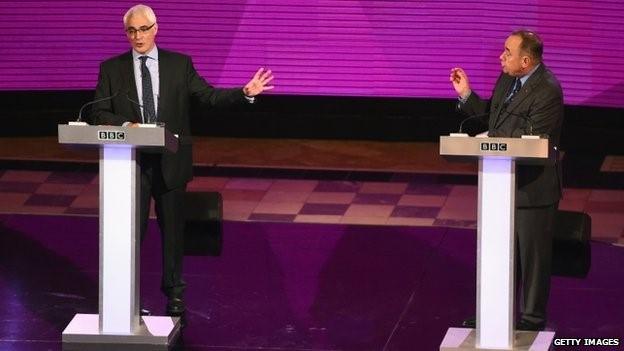Scottish referendum will test regions south of border
- Published
- comments

Will "the canny Scots" vote with their wallets?
It has been in place for over 300 years but it turns out the Act of Union between England and Scotland is a much looser affair than many of us had thought.
For once, the legalistic title is unexpectedly accurate: it is an act of union jointly engaged-in by two willing partners.
But what happens when one of those partners no longer consents? That could well be the outcome of the Scottish Independence Referendum on 18 September.
At the risk of over-simplification, it goes a long way towards explaining why the greatest constitutional question to face the UK for many centuries will be decided by the say-so of Scotland alone, while we in the rest of the UK have no say at all.
It takes two to tango but just one to turn off the music.
And the parallels do not end there.
Be the eventual answer "Yes" or "No", many things will have been said and done by then which cannot later be unsaid or undone and as so often during break-ups, other people have been listening-in.
A dis-United Kingdom?
Thanks to the televised debates which looked and sounded at times very much like a series of domestic rows between Alex Salmond and Alistair Darling, many English voters are now much better-informed as to just how much more public money is distributed per head of the population in Scotland than in England.
Figures recently published by the House of Commons Library, external also show marked disparities between English regions, but Scotland does substantially better than any of them. So too does Wales incidentally, while Northern Ireland has, for broadly obvious reasons, proportionally the best deal of all.
One veteran Midlands industrialist told me recently that Scottish sentiment and culture had little or nothing to do with it: "The canny Scots will vote with their wallets", he predicted.
All of which raises the question where the guiding principles behind this distribution of public funds came from in the first place.
Were they handed down like tablets of stone from on high perhaps? And by the way, does the Act of Union have a "pre-nup" clause?
The reality, sadly, is more prosaic.
It is not exactly the same vintage as the Act of Union, but critics believe it is long past its shelf life.
It is named after the former Labour Chief Secretary to the Treasury, Joel Barnett, who devised it in the late 70s to settle some minor cabinet disputes during the run-up to a planned political devolution process in 1979.
Though the initiative itself never materialised, his formula lingers on to this day.
Puny political beast
It is the mechanism by which the UK Treasury adjusts the amounts of public expenditure allocated to Scotland, Wales and Northern Ireland automatically to reflect changes in spending levels allocated in England, England and Wales or, in some cases, Great Britain as a whole.
Whatever the outcome in Scotland, local government leaders here are already telling me they plan to seize the moment and press the political parties to promise radical changes to these funding arrangements in their 2015 general election manifestos.
A re-examination, maybe, not just of the perennial party political tit-for-tat over whether or not rural councils receive more (or less) generous government support than their urban counterparts.

The televised debates helped inform many English voters about how much more public money is distributed in Scotland
Or, whether or not the affluent Windsors or Wokinghams do better (or worse) than the Walsalls or Wolverhamptons. Even, dare I suggest, a new deal for England?
Individual English regions like the West Midlands and the North West are not dissimilar in population size to Scotland. Granted we don't have oil but the debate about shale gas may only just have started!
But even when all the English regions are added together, their assorted local councils, enterprise partnerships and, in places, directly-elected mayors cannot disguise what a puny political beast provincial England has become, a lion that has lost its roar.
But one distinguished practitioner in the field of public sector finance told me recently that if Scotland votes to stay in the UK, "devo-max" would almost certainly widen rather than narrow the funding differentials between the north and the south of the border.
Easy to disentangle?
But let us imagine Scotland votes instead for independence.
Alex Salmond tells us the negotiations leading-up to independence day would last no more than 18 months.
The UK will go to the polls in next May's general election to elect, under the Fixed Term Parliament Act, a new government to serve for five years. The polls suggest Labour could form a government with a majority smaller than their total number of Scottish seats.
So what happens if Scotland becomes an independent country less than a year later?
Do Labour lose all those Scottish MPs, and with them, their majority? Would there have to be another general election, whatever the Fixed-Term Parliament Act may say?
If anyone can tell me the answers, please let me know.
Paradoxically, Westminster would certainly look more like an English parliament, but how healthy would that be for Wales or Northern Ireland?
Just because the Act of Union is a loose alliance of the willing does not make it easy to disentangle.
In the words of an old song which is almost as much of an antique as the act itself - breaking up is hard to do.